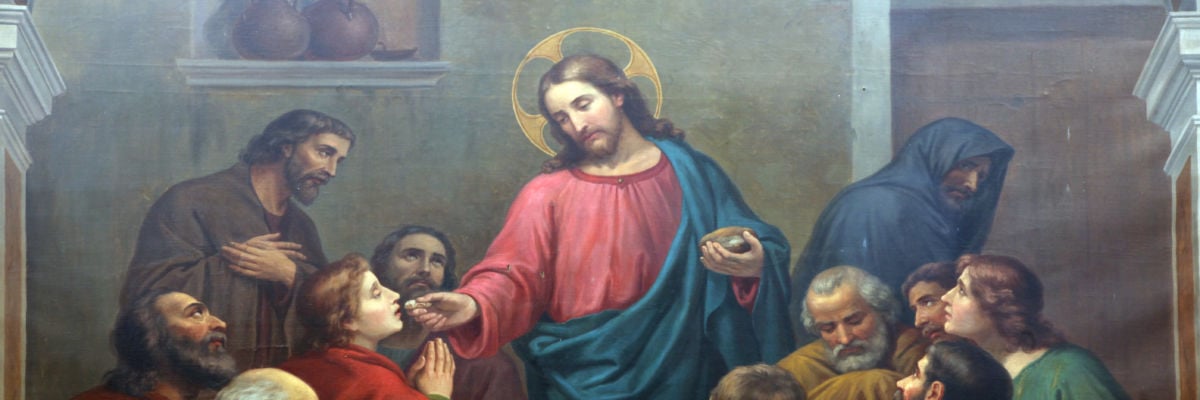
Homily for the Thirtieth Sunday in Ordinary Time, 2021
Brothers and sisters:
Every high priest is taken from among men
and made their representative before God,
to offer gifts and sacrifices for sins.
He is able to deal patiently with the ignorant and erring,
for he himself is beset by weakness
and so, for this reason, must make sin offerings for himself
as well as for the people.
No one takes this honor upon himself
but only when called by God,
just as Aaron was.
In the same way,
it was not Christ who glorified himself in becoming high priest,
but rather the one who said to him:
You are my son:
this day I have begotten you;
just as he says in another place:
You are a priest forever
according to the order of Melchizedek.-Heb. 5: 1-6
When and how did Christ become a priest?
In his divine nature as Son of the Father from all eternity, he is not a priest who offers worship, since he himself, as God, is the object of that worship.
We do not find his priesthood yet in the words of the creed: “God from God, light from light, true God of true God, begotten not made, consubstantial with the Father by whom all things were made.”
But we do find his priesthood as we continue in the creed to profess, “For us men and for our salvation he came down from heaven and by the Holy Spirit was incarnate of the Virgin Mary and became Man.”
What is a priest? He is one “taken from among men and made their representative before God, to offer gifts and sacrifices for sins.” Thus, in order for the Savior to be a priest he had to be a man.
The epistle to the Hebrews, which we are hearing in these weeks, is suffused with the awareness of the humanity of the Son of God. We read that he is not an angel, but of flesh and blood, and that when he entered this world in his human flesh he prayed, “Sacrifice and offering you did not desire, but a body you have prepared for me.”
For the Savior, the great High Priest, the day of his ordination was the moment when he took on himself a human body in the womb of Our Lady.
And his priesthood has remained ever since. The love of the Sacred Heart of Our Lord is limitless. He had his full measure of love from the moment of his conception; it never grew, since it is the source of all our love—the absolute fullness of love from the beginning.
Rightly, then, did St. John Vianney tell the faithful, “The priesthood is the love of the heart of Jesus.” He told them that when they see a priest they should think of his love!
Now, the apostle tells us that the priests of the old covenant offered sacrifices for the sins of the people, but also for their own. In this, the Savior is different. He is uniquely the perfect priest because just as his love was so great it could never grow, so it never wavered and was never lessened. Christian priests are simply instruments of the one, perfect priest, Jesus Christ. They represent and convey his perfect love, and if they have any of their own, it’s because they received it from him.
And even so, Jesus still knows what it is like to be beset by weakness; as we have been told earlier in this epistle, he is able to sympathize with those who are weak. He himself said, as he was preparing to offer the bloody sacrifice of the cross, “My heart is sorrowful even unto death.” And he begged the company and consolation of his friends, Peter, James, and John, who had just become priests of the New Covenant themselves. Since they slept, he was comforted mysteriously by an angel, as he endured the stark terror of his ordeal, now upon him.
We have said that the love of the Savior was perfect from the beginning, even in Mary’s womb. This means that the very same love that drove him in his passion was already there in his infancy. It also means that, although he “dies no more,” his Sacred Heart, gloriously risen from the dead, beats at the Father’s right hand with the same love he had on the cross. It also means that in the Blessed Sacrament of the altar his heart beats with the same love for us that he showed the good thief and St. John and his Blessed Mother.
All of this is in our reach as we celebrate the Holy Mass. Truly, the “mercy of the Lord lasts forever.” He is all ours at every moment since his incarnation, with the same perfect, overwhelmingly abundant love that he had in Nazareth, in Bethlehem, in Egypt, in Galilee, in Jerusalem, and now on high and in our tabernacles and on our altars, and in our very bodies as we offer up, adore, and receive him. All the effect of his priesthood.
His priesthood is just a more specific name for his humanity. Thus it is that all the malice of the Evil One is directed at the priesthood of the Savior. The priesthood is the love of the heart of Jesus, and anything that diminishes that love fights against his sublime ministry as the priestly savior of souls.
The priest is a mediator since he combines the one extreme of the devotion of prayer with the other extreme of mercy and compassion for the weak and the sinful. So here is another true thought: whenever we see a sinner, we should think that there is the love and mercy of Christ, because without that sinner there would be no Savior, no priesthood, no beating heart of love in the holy Mass.
So we are not all priests, but we, even those who are priests, are all sinners: glory then to poor sinners who give the Son of God a reason to love with a human heart!
Let us put our trust in him!



